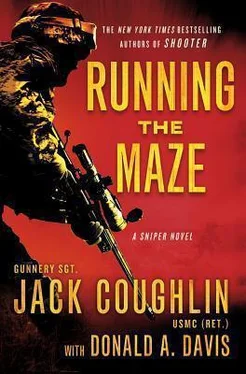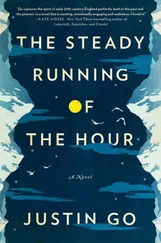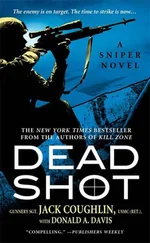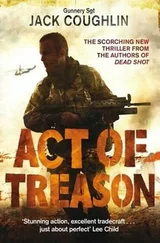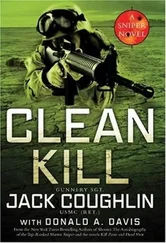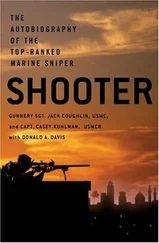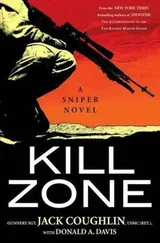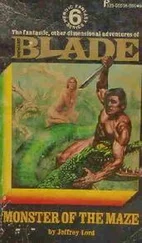Sybelle Summers cut in and pointed to the Central Intelligence Agency representative. “That will take too long. My friend here says they have much of the same capability right here at Kandahar, primarily used for time-sensitive, tactical interrogation.”
“That’s correct. Let’s see what we can do to supplement the information about the bridge and its defenses, and then ship him to Gitmo for deeper work.”
“Fine,” the Lizard replied. “Colonel Summers, the general also wants your report and recommendations ASAP, so he can take them to the White House. He gave them a heads-up that he’s coming over.”
“I’ll get him a summary within the hour; then we can link up again and do the details.”
“Sounds good. Oh, yes, the general wants to pass along his compliments to Petty Officer Ledford for her outstanding work.”
“What about me?” Kyle laughed. “I was there, too.”
“He didn’t mention you.”
THE OLD EXEC WASHINGTON, D.C.
THE PRESIDENT OF THE United States, hands in the pockets of his dark suit, strolled nonchalantly out of the basement door of the White House, beneath the maroon awning, between some parked cars, and across the narrow street to a similar basement entrance to the Old Executive Office Building, a baroque gray giant. At the moment, the entire news media corps was corralled in the White House Press Room for the routine daily briefing by his press secretary, who was giving an update on the upcoming Mars mission and confirming the president would be at the Cape for the historic launch. Camera crews were at their tripods on the front lawn, preparing for the stand-ups by the TV correspondents. No one noticed the sudden unannounced departure from the president’s public schedule, and he was in view for less than a minute, alone, as he crossed the protected street without obvious Secret Service protection.
The tall Californian was alone in numerous ways on this day, for he was facing one of the toughest decisions of his presidency—the absolute need to order a direct military attack on Pakistan, an allied nation that was an anchor in the overall war on terror in a fiery region. Only someone who knew him well could discern that the slightly hunched shoulders were actually bowed with worry. He had been pacing the Oval Office, trying to walk off the fury of once again feeling double-crossed by the Pakistanis—Osama’s compound all over again, but bigger and better—but he had calmed little by the time of this meeting just after lunch.
Members of the Secret Service detail that had unobtrusively shepherded him across the street met him at the door of Old Exec and gave verbal confirmation of the handoff to the agents at the seldom-used White House exit and to agents in the parked cars that he passed. He led the way to the second floor of the musty building, and another agent opened a normal-looking door into a comfortable large room that was thoroughly soundproof. Several easy chairs and two large sofas formed a large, loose circle. Senior administration officials had come in earlier through various entrances and were gathered in small groups. They turned to face him, and a repeated murmur of “Mr. President” acknowledged his presence. He did not shake anyone’s hand and did not flash the famous smile but proceeded to an armchair, sat, and crossed his legs. The others took seats. All eyes were on him.
There was no preamble. “Each of you has been privately briefed within the past few hours concerning this latest event in Pakistan. It is an intolerable situation. A vital ally that already had given shelter to our single biggest enemy, Osama bin Laden, has been busy creating a new and possibly worse threat to our security, and as usual, intentionally keeping it secret from us.
“There is no way to sugarcoat my decision. As you were briefed, I intend to launch a military strike to wipe out that new sanctuary, and by doing so, to send a clear message to our friends throughout the Middle East. Any new terrorist leader will never be beyond the reach of the United States, and neither will any country that gives him sanctuary.” He paused, hands clasped before him, looking from face to face.
“We will hit it hard—very hard—and that once again includes boots on the ground for a short window of time, for I consider this to be a matter of utmost national security. Our military leaders predict that if all goes well, we will be in and out of there within three hours, leaving behind nothing but a smoking ruin. Consider it to be a surgical operation to remove a deadly cancer. Pakistan has to learn that this must stop! Before I give the final order, I wanted you all together to thank you for agreeing that this course of action is necessary. Any further discussion? Questions?”
“I don’t see how we can do anything else,” declared the vice president.
“Pakistan is going to be outraged,” Secretary of State Mark Grayson added, “but that’s to be expected, and you pay me the big bucks to take the heat.”
“This time, you don’t have to,” said the president, finally falling into a smile. “To further demonstrate how pissed off we are, they don’t even get to complain to you or to me about it. Give that job to Undersecretary Curtis of the Bureau of American-Islamic Affairs, along with my order to rudely brush them off.”
“They will consider that to be a great insult,” Secretary of State Grayson replied.
“Good, because that is exactly what is intended. If they are smart, they will grab the opportunity to let the whole sleazy incident disappear instead of flying into meaningless outrage. They got off easy with the surgical SEAL Team Six raid that did bin Laden. This time, not so much.”
The president turned to the chairman of the Joint Chiefs of Staff. “There it is, General Rauch. You have a go. Give the orders. And let me remind everybody here: no leaks, or you might be visiting Guantánamo Bay for a while. Friend or not, you must believe that I am serious.”
NORTH WAZIRISTAN, TRIBAL LANDS, PAKISTAN
AYMAN AL-MASRI WAS PUFFING with exertion as he climbed the final stretch of stairs that led to a square and unassuming block building that served as the local mosque, carefully working his way around pecking chickens that darted underfoot and seemed determined to hurl him off the cliff to his death. The only door was on the west side, so that all who entered would be facing east toward Mecca, the birthplace of the Prophet.
At the end of the room was a window with a startling view of a fertile valley shielded by steep mountains, where ridgelines gave way to terraced gardens that were still green, even this far into autumn. Monstrous boulders the size of trucks stood out like ragged statues. Shaggy buffalo, a commodity so valuable that they lived indoors with their owners, hauled huge loads of goods and produce along the dirt roads. The mosque overlooked a busy little village of adobe-style mud and log homes, and on one flank of the town was a special cemetery reserved for fallen warriors of the great cause. Long sticks marked each grave, and from each stick waved a piece of cloth made from the garments worn by the dead fighter. Al-Masri was pleased that nothing at all had changed since he had left the village a few days ago.
He bowed and touched his head to the warm burgundy carpet, then announced himself with one word. “Commander.”
Kahn was at the eastern window, looking down on the village, and out to the spectacular view of the rugged tribal lands of Pakistan, where he had built his reputation as a fearless military leader and a smart political star in the terrorist firmament. He had had seen his security chief arrive by automobile, be checked out at the guard post, and start the long climb up to the mosque. He was eager to hear the report.
Читать дальше
